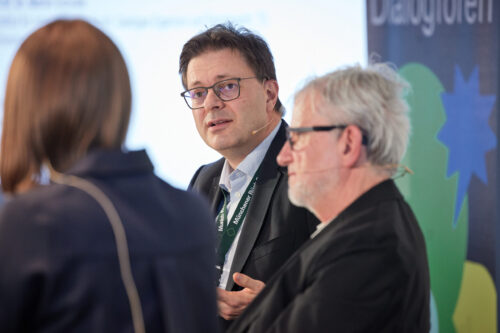Extreme weather and climate risks – Is it now up to the courts to expedite climate action?

Munich, 12 December 2023
2023 was the hottest year since records began, and the damage caused by extreme weather is increasing globally. But can individual severe weather disasters be attributed to climate change, and can certain companies and organisations or national governments be held legally responsible? Therefore, are climate lawsuits a way to stop climate change? The experts discussed these questions in depth at acatech am Dienstag on 5 December, which was organised in partnership with Munich Re Foundation.
Cases concerning climate change are increasingly coming before the courts. The most notable judgement came from the Federal Constitutional Court in 2021, as Martin Schulte from the Institute of International Law at TU Dresden explained: “I consider the decision to be groundbreaking because it set clear targets for climate protection.” The ruling of the Higher Administrative Court of Berlin-Brandenburg published at the end of November 2023 also caused a stir. This ruling requires the German government to take more climate action in the building and transport sectors. Meanwhile, a climate lawsuit is pending before the European Court of Human Rights. In this case, six young Portuguese people argue that the European Convention on Human Rights is being breached.
Constitution provides direction
But can the judicial route lead to the desired result at all? “Our constitution defines the roles relatively clearly: climate protection is first and foremost a matter for the legislator,” Martin Schulte pointed out. Decisions on climate protection are often associated with interference with our freedom to choose an occupation and the right to engage in work and the freedom to own property, and thus with issues of fundamental rights. According to the doctrine of materiality expounded by the Federal Constitutional Court, the legislator must legitimise state action in such fundamental areas by means of a formal law; i.e. make the essential decisions itself, said Professor Schulte.
The courts come into play if the applicable law is open to interpretation and provides a framework for conveying certain values. Such judicial interpretation is allowed if a law contains an unintended gap. “However, insufficient climate protection is not an unintended gap in the law. Rather, it is solely due to political failings and must first and foremost be articulated and dealt with at a parliamentary level,” argued Martin Schulte. Since the Higher Administrative Court of Berlin-Brandenburg obviously sees this differently, Professor Schulte would not be surprised if the judgement were to be appealed. “In this event, it would be a while before we had a final decision. It is doubtful whether this will turn out the way the plaintiffs imagine,” he suspects. However, there absolutely are members of the legal community who are in favour of this kind of innovative climate justice proposed by the Higher Administrative Court of Berlin-Brandenburg because, they claim, this is the only way of advancing climate action. Mr Schulte summed up as follows: “Climate protection remains a matter for the legislature, but it must implement the requirements of the Federal Constitutional Court. This is lacking in many respects.”
Who has which legal options in Germany or the EU to enforce the fulfilment of climate targets?
Martin Schulte was asked the question Who has which legal options in Germany or the EU to enforce the fulfilment of climate targets? Watch the video here (in German):
A great deal of uncertainty surrounds attribution research
Scientists are in no doubt that climate change is playing a role in the growing number of extreme weather events. However, there is still great uncertainty about the extent to which individual events can be attributed to the global rise in temperature. “Attribution studies on weather events have found, for example, that the probability of the devastating floods in the Ahr valley in Germany two years ago has increased by a factor of 1.2 to 9,” said Tobias Grimm, Head of Climate Advisory and NatCat Data with Munich Re. However, when it comes to insurance claims as a result of natural disasters, which on average account for around one third of overall economic losses worldwide, the trend is clear. “In five out of the six years since 2017, claims exceeded or came close to 100 billion dollars. This has never happened before,” noted Tobias Grimm. The main driver of losses is the hurricanes in the U.S., which tend to be getting more intense and producing more rain.
Can individual extreme weather events be clearly attributed to climate change?
Tobias Grimm was asked the question Can individual extreme weather events be clearly attributed to climate change? Watch the video here (in German):
Despite the higher claims, which in certain regions are reflected in dramatic rises in the cost of insurance, people’s risk awareness is not particularly good. The reason for this, said Ortwin Renn, is that “people cannot think in terms of probabilities”. He is a member of the acatech Executive Board and worked for many years as a director at the Research Institute for Sustainability – Helmholtz Centre Potsdam. The risk researcher cited a survey, which found that 95 per cent of respondents believe in climate change, 75 per cent believe it is man-made, but only 30 per cent feel themselves personally affected. The dilemma is that people who take measures to protect the climate and reduce their carbon footprint have to cut back but see no direct positive effects in their immediate environment.
Greater honesty, greater participation
In addition, being alarmist is counterproductive as “apocalyptic rhetoric leads to paralysis”. Instead, we should honestly address the stresses and strains with people and show how the world could change for the better after decades of transformation. “I think the prospect of a sustainable society for future generations is neglected in the debate,” said Ortwin Renn, passing criticism. “You cannot make policy from up in an ivory tower. You have to involve the people on the ground in the decision-making process,” added Munich-Re expert Tobias Grimm. When it comes to climate action, Ortwin Renn is in favour of granting emission rights, i.e. carbon credits, and arrangements designed to encourage participation, such as energy cooperatives. These small cooperatives voluntarily commit to more renewable energy without major protests ensuing, as is often the case with enforcement.
What is the key lesson for social participation the age of polycrisis has taught us?
Ortwin Renn was asked the question What is the key lesson for social participation the age of polycrisis has taught us? Watch the video here (in German):
The reinsurance industry can also help to decarbonise the world more quickly by exploring the limits of insurability. “Our solutions for performance guarantees for wind turbines or solar farms offer the necessary security to invest in the development of new energy systems,” stated Tobias Grimm. “I hope we bring about the transformation before it is forced upon us. Because if we don’t, our future will not be bright,” fears Ortwin Renn. Even if the ongoing rise in carbon emissions makes him rather pessimistic, collective optimism is a civic duty. “In order to do something, we need the confidence that things can get better.” There are therefore many different ways to motivate as many stakeholders as possible to engage in more climate action. The idea that courts can expedite climate action is only true to a very limited extent, according to legal experts such as Martin Schulte.
This article was written by cooperation partner Munich Re Foundation and is also published on its website.
The event in pictures
Photos: Oliver Jung/Munich Re

















